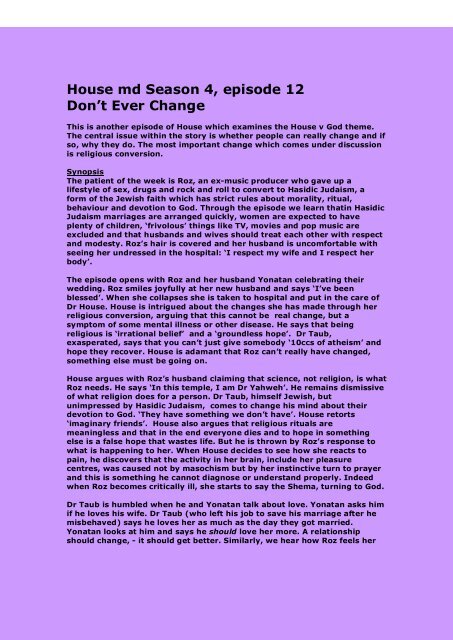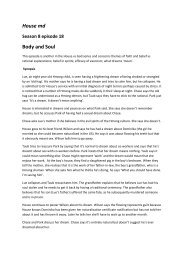House md Season 4, episode 12 Don't Ever Change
House md Season 4, episode 12 Don't Ever Change
House md Season 4, episode 12 Don't Ever Change
You also want an ePaper? Increase the reach of your titles
YUMPU automatically turns print PDFs into web optimized ePapers that Google loves.
<strong>House</strong> <strong>md</strong> <strong>Season</strong> 4, <strong>episode</strong> <strong>12</strong><br />
Don’t <strong>Ever</strong> <strong>Change</strong><br />
This is another <strong>episode</strong> of <strong>House</strong> which examines the <strong>House</strong> v God theme.<br />
The central issue within the story is whether people can really change and if<br />
so, why they do. The most important change which comes under discussion<br />
is religious conversion.<br />
Synopsis<br />
The patient of the week is Roz, an exmusic producer who gave up a<br />
lifestyle of sex, drugs and rock and roll to convert to Hasidic Judaism, a<br />
form of the Jewish faith which has strict rules about morality, ritual,<br />
behaviour and devotion to God. Through the <strong>episode</strong> we learn thatin Hasidic<br />
Judaism marriages are arranged quickly, women are expected to have<br />
plenty of children, ‘frivolous’ things like TV, movies and pop music are<br />
excluded and that husbands and wives should treat each other with respect<br />
and modesty. Roz’s hair is covered and her husband is uncomfortable with<br />
seeing her undressed in the hospital: ‘I respect my wife and I respect her<br />
body’.<br />
The <strong>episode</strong> opens with Roz and her husband Yonatan celebrating their<br />
wedding. Roz smiles joyfully at her new husband and says ‘I’ve been<br />
blessed’. When she collapses she is taken to hospital and put in the care of<br />
Dr <strong>House</strong>. <strong>House</strong> is intrigued about the changes she has made through her<br />
religious conversion, arguing that this cannot be real change, but a<br />
symptom of some mental illness or other disease. He says that being<br />
religious is ‘irrational belief’ and a ‘groundless hope’. Dr Taub,<br />
exasperated, says that you can’t just give somebody ‘10ccs of atheism’ and<br />
hope they recover. <strong>House</strong> is adamant that Roz can’t really have changed,<br />
something else must be going on.<br />
<strong>House</strong> argues with Roz’s husband claiming that science, not religion, is what<br />
Roz needs. He says ‘In this temple, I am Dr Yahweh’. He remains dismissive<br />
of what religion does for a person. Dr Taub, himself Jewish, but<br />
unimpressed by Hasidic Judaism, comes to change his mind about their<br />
devotion to God. ‘They have something we don’t have’. <strong>House</strong> retorts<br />
‘imaginary friends’. <strong>House</strong> also argues that religious rituals are<br />
meaningless and that in the end everyone dies and to hope in something<br />
else is a false hope that wastes life. But he is thrown by Roz’s response to<br />
what is happening to her. When <strong>House</strong> decides to see how she reacts to<br />
pain, he discovers that the activity in her brain, include her pleasure<br />
centres, was caused not by masochism but by her instinctive turn to prayer<br />
and this is something he cannot diagnose or understand properly. Indeed<br />
when Roz becomes critically ill, she starts to say the Shema, turning to God.<br />
Dr Taub is humbled when he and Yonatan talk about love. Yonatan asks him<br />
if he loves his wife. Dr Taub (who left his job to save his marriage after he<br />
misbehaved) says he loves her as much as the day they got married.<br />
Yonatan looks at him and says he should love her more. A relationship<br />
should change, it should get better. Similarly, we hear how Roz feels her
eligion is what she has been waiting for all her life. She has not given up<br />
anything, she has gained everything.<br />
<strong>House</strong> is further bothered when Roz refuses to have surgery until after she<br />
has celebrated Shabbat after sundown with her new husband. Dr Chase, the<br />
surgeon, (who once wanted to be a priest) suggests to <strong>House</strong> that if he is<br />
‘God’, and if Joshua made the sun stand still, perhaps <strong>House</strong> could speed it<br />
up, darken the room so she could begin Shabbat early. We see Roz and<br />
Yonatan celebrating Shabbat in her hospital room. He sings the words of the<br />
ritual for her and it is <strong>House</strong> who knows exactly what is going on and<br />
explains it to the other doctors. The husband blesses his wife: ‘strength and<br />
honour are her clothing’. <strong>House</strong> is still impatient with them for putting God<br />
first, when Roz is running out of time. He agrees with the Jewish imperative<br />
to preserve life about all other things and thinks Roz is crazy for waiting to<br />
share Shabbat with her husband.<br />
Meanwhile, <strong>House</strong> is learning in other ways about change. He finds out that<br />
his best friend Dr Wilson is going out with an ambitious, agressive and cut<br />
throat doctor that Dr <strong>House</strong> fired. <strong>House</strong> is convinced that Amber is only<br />
using Wilson to get her job back or to exact revenge on <strong>House</strong>. Gradually<br />
however, he comes to realise that both Wilson and Amber have changed and<br />
that perhaps their relationship is genuine.<br />
<strong>House</strong> discovers what is wrong with Roz (an internal abnormality which he<br />
calls a mistake on the part of God) and parts on amicable terms with Wilson,<br />
thus admitting tacitly that he has had to change too. Behind, the Rolling<br />
Stones plays ‘Waiting on a Friend’ as <strong>House</strong> comes to accept that one thing<br />
that will never change is that Wilson will always be his friend. Wilson’s<br />
parting words to <strong>House</strong> are a religious blessing: ‘Shabbat Shalom’.<br />
Excerpts to watch:<br />
Yonatan and Dr Taub talking about love<br />
The opening scene of the wedding and the scene of the Shabbat<br />
The final scene with <strong>House</strong> and Wilson<br />
Some questions for reflection:<br />
What do you make of Roz’s conversion?<br />
Do you agree with Yonatan when he says that after <strong>12</strong> years of marriage Dr<br />
Taub should love his wife more than when they were married?<br />
Do you think that it is possible for a person to change as radically as Roz<br />
and for the experience to be genuine?<br />
How do you feel about the religious scenes in the <strong>episode</strong>?<br />
What do you make of the fact that Dr <strong>House</strong> knows all about what is going<br />
on in the Shabbat?
How do you think Dr Taub changes in his thoughts and opinions throughout<br />
the <strong>episode</strong>?<br />
How does the Wilson/Amber storyline show us what <strong>House</strong> is thinking<br />
about change?<br />
Some suggested Bible passages<br />
Look up Deuteronomy 6.49; 11.1321 and Numbers 15.3741 which make<br />
up the Shema. For Reform Jews, the first passage is the most important and<br />
the other two are sometimes not used.<br />
Proverbs 31.10ff<br />
Joshua 10.1114<br />
John 3.121














